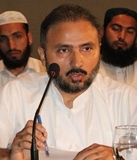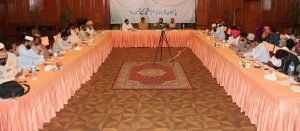Distortion of history erodes social harmony
In today’s modern world we can’t rely upon religion to design the contours of societies during its make-up phase. Pakistan’s history was interpreted in a distorted way. Had it not been so, we wouldn’t have been confronted with such a widened political cohesion gap.
These views were expressed during a workshop organized by Pak Institute for Peace Studies (PIPS) in Lahore.
More than fifty renown religious academics and learned scholars of the country participated in the workshop, including Dr. Qibla Ayaz, former Vice Chancellor, University of Peshawar; Romana Bashir, Executive Director, Peace and Development Foundation; Khursheed Ahmad Nadeem, anchorperson and columnist; Ammar Khan Nasir, Al-Sharia Academy, Gujranwala; Sahibzada Amanat Rasool, Principal Idarra Fiqare-e-Jadeed and Muhammad Amir Rana, Director, PIPS.
 Sharing thoughts on social cohesion, Romana Bashir said that unbiased approach was not adopted while compiling the history of Pakistan. Rather, she said, proponents of a certain ideology hold the narratives of state, distorting its very basic contours.
Sharing thoughts on social cohesion, Romana Bashir said that unbiased approach was not adopted while compiling the history of Pakistan. Rather, she said, proponents of a certain ideology hold the narratives of state, distorting its very basic contours.
“The existing narratives of state have made not only the inter-religious harmony a distant dream but inter-racial issues too pose incalculable challenges”, said Romana Bashir.
She further added that we can resolve the grievances of minorities in an amicable method, if we resort to Medina Accord as our benchmark. This way, not only will we alleviate other sects’ grievances but will also pave way for bringing inter-religious harmony in the country.
Sahibzada Amanat Rasool, while addressing the occasion, said that the preachers and defenders of different faiths have distorted the original shape of their respective religions, notwithstanding the fact that every religion has an integral message of morality and ethics in its essence.
Prominent television anchor Khursheed Nadeem said that we might be having differences over shariah implementation but not over common values of humanities. “They are all the same”, he said.
 “In the contemporary world, we can’t design frontiers of a state with religion, and if a state tries doing so, then inter-religious harmony would always remain a dream to be fulfilled”, he argued. He urged the ulemas to bring religious harmony in areas where they are in majority.
“In the contemporary world, we can’t design frontiers of a state with religion, and if a state tries doing so, then inter-religious harmony would always remain a dream to be fulfilled”, he argued. He urged the ulemas to bring religious harmony in areas where they are in majority.
 Dr. Qibla Ayaz argued that in “today’s world, hatred has also taken the shape of million-dollars business.” “Weapons wouldn’t be sold, without conflict”, he said. He also accused the some religious scholars of supporting an environment of hatred and indifference than mutual trust and confidence building. “We need inter-religious debates than dialogues”, he recommended.
Dr. Qibla Ayaz argued that in “today’s world, hatred has also taken the shape of million-dollars business.” “Weapons wouldn’t be sold, without conflict”, he said. He also accused the some religious scholars of supporting an environment of hatred and indifference than mutual trust and confidence building. “We need inter-religious debates than dialogues”, he recommended.
 Dr. Dan Tidten, Head of Press and Cultural Section, Embassy of the Federal Republic of Germany had been passed through such issues, but they were resolved with confidence. “Today,” he said, “the inter-religious harmony is prospering in its full bloom there.”
Dr. Dan Tidten, Head of Press and Cultural Section, Embassy of the Federal Republic of Germany had been passed through such issues, but they were resolved with confidence. “Today,” he said, “the inter-religious harmony is prospering in its full bloom there.”
 Meanwhile, Ammar Khan Nasir urged the young religious scholars to come forward in playing their role in resolving ideological ambiguities.
Meanwhile, Ammar Khan Nasir urged the young religious scholars to come forward in playing their role in resolving ideological ambiguities.
 Director PIPS, Muhammad Amir Rana, was pessimistic about the role of religious scholars of different sects in bringing inter-faith harmony in our society. “As a nation, we can’t progress until and unless we denounce the division of society through factions and faiths”, he said.
Director PIPS, Muhammad Amir Rana, was pessimistic about the role of religious scholars of different sects in bringing inter-faith harmony in our society. “As a nation, we can’t progress until and unless we denounce the division of society through factions and faiths”, he said.


